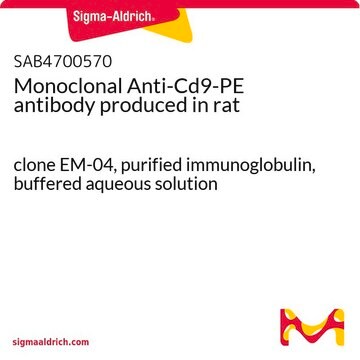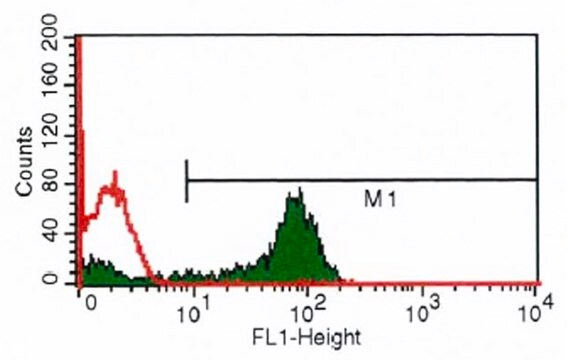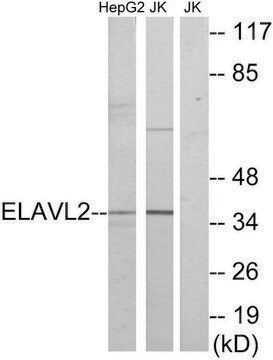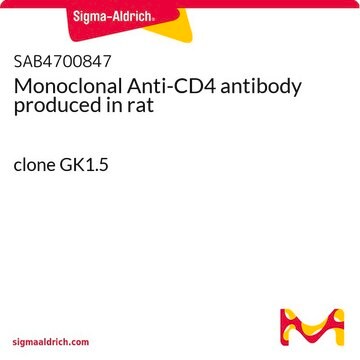SAB4700062
Monoclonal Anti-CD4-FITC , (N-terminal) antibody produced in mouse
clone MEM-241, purified immunoglobulin, buffered aqueous solution
Iniciar sesiónpara Ver la Fijación de precios por contrato y de la organización
About This Item
UNSPSC Code:
12352203
NACRES:
NA.44
Productos recomendados
biological source
mouse
Quality Level
conjugate
FITC conjugate
antibody form
purified immunoglobulin
antibody product type
primary antibodies
clone
MEM-241, monoclonal
form
buffered aqueous solution
species reactivity
human
technique(s)
flow cytometry: suitable
isotype
IgG1
NCBI accession no.
UniProt accession no.
shipped in
wet ice
storage temp.
2-8°C
target post-translational modification
unmodified
Gene Information
human ... CD4(920)
General description
Cluster of differentiation 4 (CD4) molecule is encoded by the gene mapped to human chromosome 12p13.31. The encoded protein is mainly localized on the surface of specific leukocytes. CD4 is characterized with a four ecto-domains (D1-D4) of which D1, D2 and D4 contain disulfide bonds.
The antibody MEM-241 recognizes CD4 antigen, a 55 kDa transmebrane glycoprotein expressed on a subset of T lymphocytes ("helper" T-cells) and also on monocytes, tissue macrophages and granulocytes.
Immunogen
2 N-terminal domains of human CD4 fused to human IgG1 Fc
Application
The reagent is designed for Flow Cytometry analysis of human blood cells using 20 μL reagent / 100 μL of whole blood or 1e6 cells in a suspension. The content of a vial (2 mL) is sufficient for 100 tests.
Biochem/physiol Actions
Cluster of differentiation 4 (CD4) facilitates the activation of immunostimulatory T-cells. It serves as a primary receptor for human immunodeficiency virus (HIV)-1 entry. The encoded protein also plays a key role in altering cell elasticity. Elevated expression of soluble CD4 has been observed in patients of infectious and chronic inflammatory diseases and rheumatoid arthritis (RA). Thus, this protein can be used as a potential diagnostic marker for the development of RA.
Features and Benefits
Evaluate our antibodies with complete peace of mind. If the antibody does not perform in your application, we will issue a full credit or replacement antibody. Learn more.
Physical form
Solution in phosphate buffered saline containing 15 mM sodium azide and 0.2% high-grade protease free BSA as a stabilizing agent.
Disclaimer
Unless otherwise stated in our catalog or other company documentation accompanying the product(s), our products are intended for research use only and are not to be used for any other purpose, which includes but is not limited to, unauthorized commercial uses, in vitro diagnostic uses, ex vivo or in vivo therapeutic uses or any type of consumption or application to humans or animals.
¿No encuentra el producto adecuado?
Pruebe nuestro Herramienta de selección de productos.
Storage Class
10 - Combustible liquids
wgk_germany
WGK 2
flash_point_f
Not applicable
flash_point_c
Not applicable
Elija entre una de las versiones más recientes:
¿Ya tiene este producto?
Encuentre la documentación para los productos que ha comprado recientemente en la Biblioteca de documentos.
Disease severity in rheumatoid arthritis: Relationships of plasma tumor necrosis factor-α, soluble interleukin 2-receptor, soluble CD4/CD8 ratio, neopterin, and fibrin D-dimer to traditional severity and functional measures
Beckham JC, et al.
Journal of clinical immunology, 12(5), 353-361 (1992)
The role of CD4 on mechanical properties of live cell membrane
Bui VC and Nguyen TH
Journal of Biomedical Materials Research Part A, 104(1), 239-244 (2016)
Human CD4 Metastability Is a Function of the Allosteric Disulfide Bond in Domain 2
Owen GR, et al.
Biochemistry, 55(15), 2227-2237 (2016)
Isochromosomes 12p and 9p: parental origin and possible mechanisms of formation
Dutly F, et al.
European Journal of Human Genetics, 6(2), 140-144 (1998)
Nuestro equipo de científicos tiene experiencia en todas las áreas de investigación: Ciencias de la vida, Ciencia de los materiales, Síntesis química, Cromatografía, Analítica y muchas otras.
Póngase en contacto con el Servicio técnico








